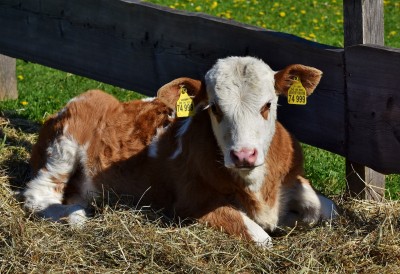Raising the Orphan Calf, by Dr. Rosslyn Biggs

Raising The Orphan Calf
Rosslyn Biggs, Oklahoma State University State Extension Beef Veterinarian
Raising an orphaned beef calf can be time consuming and may require additional expense. Additionally, calves may not be thriving at the time they are orphaned so managing health and nutrition can present challenges. Below are considerations when creating a plan.
Nutrition
Age has significant influence on the nutritional considerations for an orphaned calf. High quality colostrum should be fed to calves that lose their dams at less than 24 hours of age. Producers should not wait to administer colostrum if there is evidence the calf has not nursed.
Beyond the first day of life, calves need 10-12% of their body weight in milk per day. A good rule of thumb is that one gallon of milk equals eight pounds. Feeding multiple times per day from a bottle or bucket are both options, however, nursing from a bottle closely mimics the nursing of the udder.
The quality of a milk replacer is critical, and the calf should be consistently fed with the same product. Milk replacers should, at a minimum, be at least 15% fat and 22% protein. Milk should be at 101-105 degrees F when fed.
Within the first week after birth, offer a calf starter ration of pellets or other creep feed along with high quality hay. Once the calf is beginning to consume ½ to 2 pounds of dry feed daily, slow bottle weaning can be initiated. Unlike in dairy calves, best results are seen if a beef calf is fed milk for several months. At eight weeks of age, the calf's weight should have double since birth.
Fresh water should be always available. Water buckets, bottles, and feed pans should be regularly cleaned and sanitized.
Temperature
Calves, especially newborns, do not have the ability to easily maintain their core temperatures. Environmental conditions such as wind and outside temperatures below 50 degrees F may lead to cold stress. Especially during the winter, calves may need to be taken indoors for rewarming and fluids if their temperature drops below 99 degrees F.
Bedding can also help maintain calf temperature. Deep bedding such as straw should be available and regularly refreshed. Housing should be well ventilated areas, clean, and dry.
Health
Fever, decreased appetite, coughing, and diarrhea can all be clinical signs of concern. Producers should work with their veterinarians in advance to develop treatment plans and have medications on hand for commonly seen conditions.
Upcoming Events
IPM Strategies to Protect Corn and Soybean Seed in NY
July 30, 2025
Hamburg , NY
SWNYDLFC and Cornell IPM are hosting a grower meeting to discuss integrated pest management strategies for protecting corn and soybean seed in New York.
FAMACHA Training for Sheep and Goat producers in Woodhull NY
August 13, 2025 : FAMACHA Training in Woodhull
Woodhull, NY
Join us for a discussion and hands-on training for internal parasite integrated pest management in sheep and goats. Certification is available to all students participating in the workshop.
Cover Crop & Soil Health Field Day
August 13, 2025
Andover, NY
Please join us for a morning of hands-on learning with expert insights from local farmers, industry representatives, and extension. We will have some demonstration plots in action along with discussion about how cover crops influence soils and demonstration showing impacts on farm resiliency.
Announcements
No announcements at this time.





